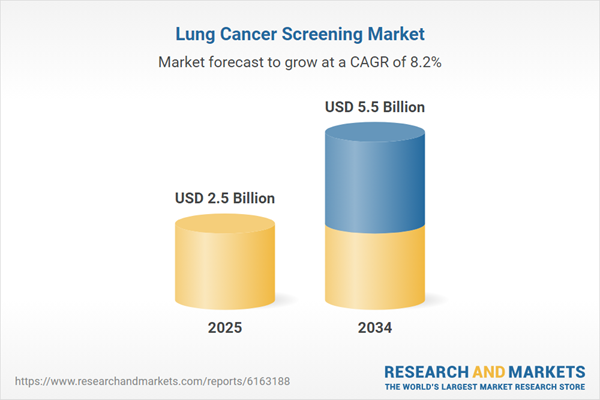Lung Cancer Screening: Introduction
Screening is the process of examining cancer in individuals with no symptoms. This can help detect cancer at an early stage, which can increase the chances of successful treatment. Scientists conduct research on screening tests to identify those that have the least harmful effects and the most benefits. Cancer screening trials are also conducted to determine whether early detection (finding cancer before it causes symptoms) can help a person live longer or reduce the risk of dying from the disease. For certain types of cancer, the chances of recovery are higher if the disease is detected and treated at an early stage.Global Lung Cancer Screening Market Analysis
The lung cancer screening market growth is driven by key trends such as technological advancements, updated screening guidelines, robust research activities, and ongoing clinical trials. The integration of Artificial Intelligence (AI) and Machine Learning (ML) in lung cancer screening represents a pivotal take. AI/ML tools have the capability to assess chronic diseases on CT scans, offering opportunities for enhanced, high-quality screening and enhancing population health.Furthermore, the updated screening guidelines released by the American Cancer Society (ACS) on November 1, 2023, are expected to play a pivotal role in saving more lives. The revised guidelines recommend annual lung cancer screening for individuals aged 50 to 80 with a history of smoking, aligning closely with the 2021 U.S. Preventive Services Task Force (USPSTF) recommendations but eliminating the 'years since quitting' requirement. These guidelines provide a comprehensive framework for healthcare providers, fostering a more targeted and efficient screening process.
Research activities, particularly in the realm of Low dose computed tomography (LDCT) screening, reinforce the effectiveness of lung cancer screening in reducing mortality. Recent studies showcased at the International Association for the Study of Lung Cancer emphasize the significance of LDCT in early detection.
Moreover, innovative Artificial Intelligence models developed by MIT researchers, offering personalized risk assessment based on CT scans, add another layer of sophistication to lung cancer screening, bolstering the global lung cancer screening market demand.
The market is further driven by ongoing clinical trials, exemplified by the NYU Langone Health-sponsored trial focusing on lung cancer biomarkers and screening. This extensive study, initiated in 2000 and set to conclude in 2023, aims to identify and validate biomarkers for early lung cancer detection, particularly in high-risk individuals. The trial underscores the importance of a personalized approach in screening, emphasizing the potential to detect preneoplastic cellular changes and lesions in at-risk populations.
Global Lung Cancer Screening Market Segmentations
Lung Cancer Screening Market Report and Forecast 2025-2034 offers a detailed analysis of the market based on the following segments:Market Breakup by Type
- Low dose computed tomography (LDCT)
- X-ray
Market Breakup by Age Group
- 50 and older
- Below 50
Market Breakup by End User
- Hospitals
- Diagnostic Centers
- Others
Market Breakup by Region
- North America
- Europe
- Asia Pacific
- Latin America
- Middle East and Africa
Global Lung Cancer Screening Market Overview
The market is expected to be propelled by several key factors highlighting the urgency and importance of early detection. The increasing utilization of low dose computed tomography (LDCT) for lung cancer screening by healthcare professionals is a major factor driving market growth. The endorsement of annual screening for asymptomatic individuals aged 50 to 80 years, with a history of smoking (current or former) and a ≥20 pack-year smoking history, by esteemed organizations such as the American Cancer Society has led to a surge in screening procedures. This strong recommendation, supported by moderate-quality evidence, signifies the important role of LDCT in identifying lung cancer at its early, more treatable stages. The rise in awareness regarding innovative and affordable lung cancer screening techniques, particularly in developing countries is among the major factors propelling the global lung cancer screening market growth.Lung cancer accounts for the highest mortality rates among both men and women globally which is a great concern. Smoking accounts for approximately 85% of all lung cancer cases, highlighting the importance of early screening for patients at risk. With an estimated 238,340 new cases expected in the United States in 2023, lung cancer ranks as the second most common cancer in the country. This prevalence exhibits the necessity for expanded and efficient screening initiatives. The projected increase in screening procedures, driven by the imperative for early detection, is poised to create a substantial demand for lung cancer screening technologies and services, thereby boosting the growth of the global lung cancer screening market.
Global Lung Cancer Screening Market: Competitor Landscape
The key features of the market report include patent analysis, grants analysis, clinical trials analysis, funding and investment analysis, partnerships, and collaborations analysis by the leading key players. The major companies in the market are as follows:- Canon Medical Systems
- Eon Health
- Fujifilm Holdings Corporation
- Koninklijke Philips N.V.
- Medtronic Plc
- Microsoft Corporation (Nuance Communications, Inc)
- Penrad Technologies Inc.
- Miltenyi Biotec
- Volpara Solutions Limited.
- General Electric
This product will be delivered within 3-5 business days.
Table of Contents
Companies Mentioned
- Canon Medical Systems
- Eon Health
- Fujifilm Holdings Corporation
- Koninklijke Philips N.V.
- Medtronic Plc
- Microsoft Corporation (Nuance Communications, Inc)
- Penrad Technologies Inc.
- Miltenyi Biotec
- Volpara Solutions Limited.
- General Electric
Table Information
| Report Attribute | Details |
|---|---|
| No. of Pages | 350 |
| Published | July 2025 |
| Forecast Period | 2025 - 2034 |
| Estimated Market Value ( USD | $ 2.5 Billion |
| Forecasted Market Value ( USD | $ 5.5 Billion |
| Compound Annual Growth Rate | 8.2% |
| Regions Covered | Global |
| No. of Companies Mentioned | 10 |









